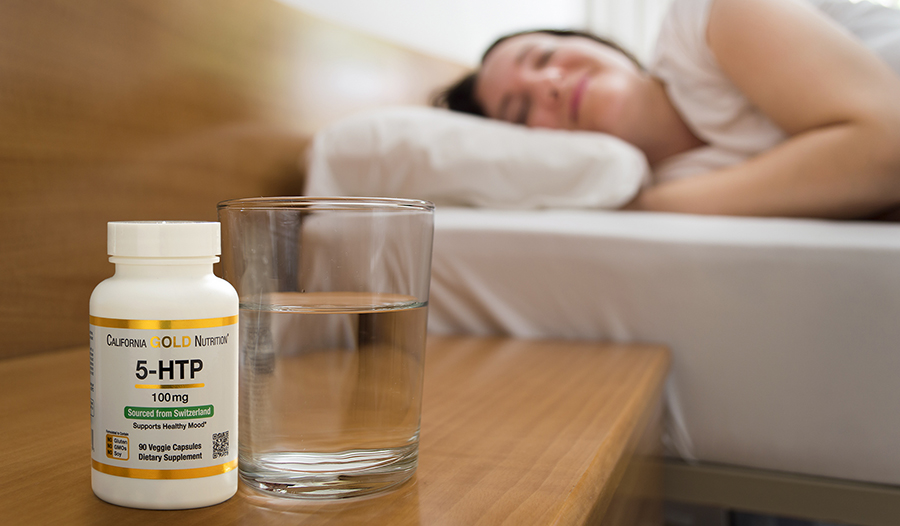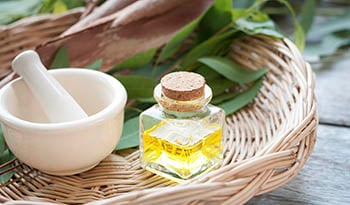Wytwarzamy melatoninę z serotoniny: oto dlaczego ma to znaczenie

Zdecydowanie jedna z najczęstszych rozmów, które prowadzę z moimi klientami, dotyczy snu i tego, jak wpływa na niego światło, czas, posiłki, ruch i, co ważniejsze, nasz nastrój. Często moi klienci są zszokowani, gdy dowiadują się o związku między serotoniną i melatoniną. i dlaczego ma to znaczenie dla snu. W tym artykule omówimy oba te neurohormony i sposób, w jaki możesz je naturalnie wytwarzać lub przyjmować jako suplement, aby pomóc Ci uzyskać najlepszy nocny odpoczynek.
Melatonina powstaje z serotoniny
Melatonina, "hormon snu i przeciwutleniacz", jest w rzeczywistości wytwarzany z serotoniny, neurohormonu, który pomaga nam czuć się szczęśliwym i spokojnym.
Jeśli jesteś zaskoczony słysząc to, nie jesteś sam!
Wielu moich klientów jest zszokowanych słysząc, że taki związek istnieje. Ich pierwsze pytanie zwykle brzmi: "Czy to oznacza, że jeśli nie mam wystarczającej ilości serotoniny, nie mogę wytwarzać melatoniny?".
Odpowiedź brzmi: tak! Dlatego tak ważna jest optymalizacja produkcji serotoniny, jeśli próbujesz zoptymalizować produkcję melatoniny i sen.
Prawda jest taka, że nie musisz przyjmować leków ani suplementów, aby wytworzyć którąkolwiek z tych substancji chemicznych, jeśli wiesz, jak wykorzystać żywność i styl życia na swoją korzyść. Jeśli przyjmujesz suplementy, aby zapewnić sobie wystarczającą ilość serotoniny i melatoniny, istnieje dobry i zły sposób, aby to zrobić.
Co to jest melatonina i jak powstaje?
Melatonina to neurohormon wytwarzany przez szyszynkę, który ma kilka głównych funkcji, w tym działanie jako silny przeciwutleniacz i związek przeciwzapalny, który może być powiązany z dobrą regeneracją fizyczną i długowiecznością. Melatonina pomaga również ludziom biologicznie zarządzać zmianami pór roku, a nawet może pomóc w leczeniu jet lag. Jest to również absolutnie niezbędne, aby dobrze się wyspać.
Szyszynka, w której wytwarzana jest melatonina, znajduje się w obu półkulach mózgu. Jego podstawową rolą u ssaków jest regulacja cyklu snu i czuwania.
Szyszynka jest stymulowana przez komórki fotoreceptorowe w twojej siatkówce. Kiedy "widzisz" światło, aktywuje ono elektryczny łańcuch zdarzeń od oczu do rdzenia kręgowego i dalej do mózgu, tworząc rytm okołodobowy. Szyszynka działa w połączeniu z Twoim rytmem dobowym, wytwarzając substancje chemiczne, które pozwalają Ci pozostać przytomnym i czujnym lub uspokoić się i dobrze wypocząć.
Wiele osób nie zdaje sobie sprawy, że twój rytm dobowy jest dosłownie powiązany z twoim środowiskiem i zmienia się w zależności od temperatury i dostępności światła.
Wewnątrz szyszynki dzieje się magia. (Żartuję, to nie magia - to nauka!) Szyszynka pobiera hormon serotoninę i wykorzystuje enzymy do przekształcenia go w N-acetyloserotoninę. Enzymy te są stymulowane przez ciemność. Konwersja nie może mieć miejsca, jeśli twoje oczy są wystawione na działanie światła.
Jeśli nadal jest ciemno, N-acetyloserotonina jest przekształcana w melatoninę, która pomaga w zasypianiu. Im więcej masz serotoniny, tym więcej melatoniny może wytworzyć twój mózg, o ile warunki są odpowiednie.
Wniosek z tego jest taki, że jeśli masz wystarczającą ilość serotoniny w mózgu, możesz użyć ciemnego oświetlenia, aby przekształcić ją w melatoninę, która pomoże ci zasnąć.
Czym jest serotonina?
Serotonina jest neurohormonem niezbędnym do prawidłowego funkcjonowania mózgu. W ciągu ostatnich kilku lat serotonina stała się "popularnym" hormonem ze względu na rozpowszechnienie selektywnych inhibitorów wychwytu zwrotnego serotoniny (SSRI), które są powszechnie przepisywane na depresję. Leki te podkreślają znaczenie serotoniny w równoważeniu i łagodzeniu naszych nastrojów.
Serotonina jest hormonem wytwarzanym z aminokwasu tryptofanu i witamin B12, kwasu foliowego i BH4 (tetrahydrobiopteryny, która jest wytwarzana z kwasu foliowego i witaminy B12).
Niektóre z tych witamin możesz łatwo uzyskać poprzez swoją dietę. Na przykład, folian jest bogaty w groszek czarnooki, szpinak i wątrobę wołową, a witamina B12 jest powszechnie spotykana w wątrobie wołowej, różnych rodzajach owoców morza, odżywczych drożdżach, mleku i jogurcie. Tryptofan, aminokwas, znajduje się w żywności o wysokiej zawartości białka . Jeśli jesteś weganinem lub wegetarianinem, możesz skorzystać na zwiększeniu spożycia pokarmów bogatych w białko , aby zapewnić odpowiednie spożycie tryptofanu.
Możesz przyjmować L-tryptofan jako suplement diety lub jeszcze lepiej formę tryptofanu znaną jako 5-hydroksytryptofan lub 5-HTP. 5-HTP jest o krok bliżej serotoniny niż L-tryptofan. Badania kliniczne wykazały, że 5-HTP zapewnia bardziej wydajną konwersję do serotoniny i lepsze wyniki w zakresie poprawy nastroju i snu.
Jeśli zdecydujesz się na suplementację, najpierw skonsultuj się z lekarzem, ponieważ 5-HTP może wchodzić w interakcje z wieloma lekami , a nawet powodować zespół serotoninowy. 5-HTP może wchodzić w interakcje z wieloma lekami , a nawet powodować zespół serotoninowy.
Co robi serotonina?
Jak wspomniano wcześniej, głównym zadaniem serotoniny jest łagodzenie naszych nastrojów. Pomaga nam również z pamięcią, a nawet wspiera procesy hormonalne i metaboliczne. Oczywiście serotonina jest również niezbędna do wytwarzania melatoniny, która ma kluczowe znaczenie dla zdrowego snu - i z kolei pomaga poprawić nasz nastrój!
Odpoczynek, funkcjonowanie mózgu i nastrój są ze sobą ściśle powiązane, a naukowcy cały czas dowiadują się więcej o tych złożonych zależnościach.
Higiena snu promująca produkcję melatoniny
Jeśli twoje ciało jest w stanie wyprodukować wystarczającą ilość serotoniny, będzie w stanie wytworzyć melatoninę, abyś mógł odpowiednio wypocząć. Sztuczka polega jednak na tym, że enzymy wymagane do zmiany serotoniny w melatoninę są aktywowane przez ciemność - co oznacza, że nie możesz wystawiać oczu na działanie światła na 30 minut przed planowanym snem, jeśli chcesz, aby mózg naturalnie wytwarzał melatoninę.
Praca z tą nauką jest łatwa. Po prostu unikaj niebieskiego światła - rodzaju światła emitowanego przez ekrany laptopów i telefonów - przez pół godziny przed pójściem spać. Dzieje się tak, ponieważ niebieskie światło wyłącza enzymy, które przekształcają serotoninę w melatoninę.
Osobiście noszę okulary emitujące niebieskie światło za każdym razem, gdy siadam do pracy przy laptopie i staram się całkowicie unikać ekranów po kolacji. (Jeśli z jakiegoś powodu muszę pracować do późna, okulary wracają!) .
Powinieneś także unikać jasnych białych lub fluorescencyjnych świateł górnych. Po kolacji zalecam użycie świec lub żółtych świateł, jeśli to konieczne, aby oświetlić swój dom i utrzymywać światła tak przyciemnione, jak to tylko możliwe. Lampy solne są świetną opcją na noc, gdy musisz widzieć, ale chcesz mieć żółtą/pomarańczową atmosferę, która nie będzie zakłócać produkcji melatoniny.
Jak widzisz, istnieje wiele ważnych czynników, które muszą się zgrać w odpowiednim czasie, aby wyprodukować wystarczającą ilość melatoniny z serotoniny. W dni, w które nie możesz uniknąć światła przed snem, przyjmowanie suplementu melatoniny może być dobrym rozwiązaniem, aby ominąć ten proces i pomóc mózgowi zabrać się za jakość snu. 1-3 mg to zazwyczaj wystarczająca dawka, aby zasygnalizować twojemu mózgowi, że nadszedł czas na relaks.
Jeśli nadal masz problemy ze snem po odpowiednim stosowaniu suplementu, to prawdopodobnie brak melatoniny nie jest problemem i powinieneś porozmawiać z lekarzem o innych opcjach. Jak zawsze, skonsultuj się z wykwalifikowanym lekarzem przed przyjęciem jakichkolwiek nowych suplementów, aby upewnić się, że są one dla Ciebie odpowiednie i bezpieczne.
Wreszcie, jeśli przebywasz w środowisku, w którym nie możesz kontrolować ekspozycji na światło, użyj maski na oczy, aby zablokować światło budzików, światła ulicznego wpadającego przez okno lub innych drobnych, nocnych irytacji.
Na wynos
Jeśli wyniesiesz coś z tego artykułu, mam nadzieję, że będzie to następujące: możesz naturalnie wytwarzać własną melatoninę, jeśli zastosujesz właściwe podejście.
Zapewniając sobie wystarczającą ilość składników odżywczych do produkcji serotoniny i wyłączając laptopa, wylogowując się z poczty e-mail po pracy i pozwalając sobie na odpoczynek w łagodnym oświetleniu przez 30 minut lub dłużej przed snem, dajesz swojemu ciału najlepszą szansę na naturalny sen - a dobry sen pozwala ci być wspaniałym, pełnym energii, produktywnym sobą w ciągu dnia!
Referencje:
- Bamalan OA, Al Khalili Y. Fizjologia, Serotonina. [Aktualizacja 2021 25 marca]. W: StatPearls [Internet]. Treasure Island (FL): StatPearls Publishing; 2021 styczeń-. Dostępne na stronie: https://www.ncbi.nlm.nih.gov/books/NBK545168/
- Henry, Kathryn. "Odżywiaj się zgodnie ze swoim typem mózgu". Dr Kate Henry. https://www.doctorkatehenry.com/eatrightbraintype Dostęp 19 grudnia 2021 r.
- Foster, Russell G. "Melatonina." Current Biology. Vol. 31, Issue 22, 2021. https://doi.org/10.1016/j.cub.2021.10.029.
- "Szyszynka i melatonina". Colostate.edu, 2018, www.vivo.colostate.edu/hbooks/pathphys/endocrine/otherendo/pineal.html. Dostęp 5 stycznia 2022 r.
- "Zrozumieć sen: Podstawy mózgu". Biuro Komunikacji i Łączności Publicznej. Narodowy Instytut Zdrowia. https://www.education.ninds.nih.gov/brochures/17-NS-3440-C_508C.pdf Dostęp 19 grudnia 2021 r.
WYŁĄCZENIE ODPOWIEDZIALNOŚCI:Celem niniejszej Strefy Zdrowia nie jest stawianie diagnoz...

















































































 Spis treści
Spis treści















